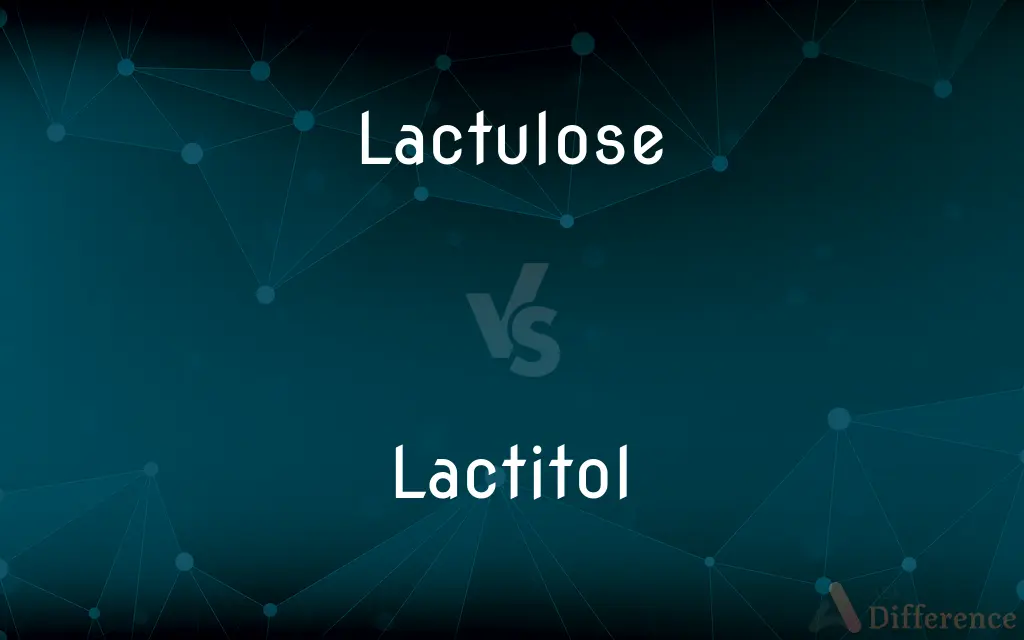Lactulose vs. Lactitol — What's the Difference?
Edited by Tayyaba Rehman — By Urooj Arif — Updated on April 9, 2024
Lactulose is a synthetic sugar used as a laxative, while Lactitol is a sugar alcohol used as a sweetener and laxative.

Difference Between Lactulose and Lactitol
Table of Contents
ADVERTISEMENT
Key Differences
Lactulose is a synthetic disaccharide that the body cannot fully digest, leading to its use primarily for treating constipation and hepatic encephalopathy. Whereas Lactitol, a sugar alcohol derived from lactose, is used not only as a laxative but also as a low-calorie sweetener in various food products.
While both compounds are derived from lactose and have laxative properties, Lactulose acts by drawing water into the bowel to soften stools and stimulate bowel movements. On the other hand, Lactitol also osmotically retains water in the bowel but is additionally used in food production for its sweetness, which is about 40% that of sucrose.
Lactulose is typically administered orally or rectally and is available in liquid or powder form for medical use. In contrast, Lactitol is available as a powder that can be used both as a medication and a food additive, offering versatility in application.
The side effects of Lactulose and Lactitol can overlap, including bloating, gas, and abdominal discomfort, but their use as sweeteners distinguishes Lactitol, which can be consumed by diabetics and those watching their calorie intake.
Comparison Chart
Type
Synthetic sugar
Sugar alcohol
ADVERTISEMENT
Primary Use
Laxative, hepatic encephalopathy treatment
Laxative, low-calorie sweetener
Derived From
Lactose
Lactose
Mechanism
Draws water into the bowel to soften stools
Osmotically retains water in the bowel, sweetens food
Form
Liquid, powder
Powder
Sweetness
Not used as a sweetener
About 40% the sweetness of sucrose
Side Effects
Bloating, gas, abdominal discomfort
Bloating, gas, abdominal discomfort, suitable for diabetics
Compare with Definitions
Lactulose
Medical Use.
Lactulose is prescribed to treat constipation and hepatic encephalopathy.
Lactitol
Sweetness Profile.
Lactitol provides about 40% the sweetness of sucrose.
Lactulose
Mechanism of Action.
Lactulose works by drawing water into the bowel, aiding in stool softening.
Lactitol
Use in Food Industry.
Lactitol is used in sugar-free and low-calorie foods.
Lactulose
Side Effects.
Common side effects include bloating and gas.
Lactitol
Formulation.
Available in powder form, Lactitol is versatile in medical and culinary uses.
Lactulose
Formulation.
Lactulose comes in liquid or powder form for ease of administration.
Lactitol
Dual Purpose.
Lactitol serves as both a laxative and a low-calorie sweetener.
Lactulose
Not a Sweetener.
Unlike Lactitol, Lactulose is not used as a sweetener in foods.
Lactitol
Suitable for Diabetics.
Lactitol can be consumed by diabetics as a sugar substitute.
Lactulose
Lactulose is a non-absorbable sugar used in the treatment of constipation and hepatic encephalopathy. It is used by mouth for constipation and either by mouth or in the rectum for hepatic encephalopathy.
Lactitol
Lactitol is a sugar alcohol used as a replacement bulk sweetener for low calorie foods with 30–40% of the sweetness of sucrose. It is also used medically as a laxative.
Lactitol
(organic compound) A sugar alcohol, 4-O-α-D-galactopyranosyl-D-glucitol, derived from lactulose; it is used as an artificial sweetener (E966)
Common Curiosities
What is Lactulose used for?
Lactulose is used as a laxative and for treating hepatic encephalopathy.
What makes Lactitol unique as a sweetener?
Lactitol is unique for being a sugar alcohol that acts as a low-calorie sweetener and laxative, suitable for diabetics.
Can Lactulose be used as a sweetener like Lactitol?
No, Lactulose is not used as a sweetener; its primary function is medicinal.
How do Lactulose and Lactitol work as laxatives?
Both work osmotically by retaining water in the bowel, but Lactulose specifically draws water into the bowel to soften stools and stimulate bowel movements.
Can both Lactulose and Lactitol be used in pediatric patients?
Yes, with appropriate dosing, both can be used in pediatric patients, primarily for constipation.
Are Lactulose and Lactitol available over the counter?
Lactulose and Lactitol are available over the counter in many countries, but regulations may vary.
How does the sweetness of Lactitol compare to regular sugar?
Lactitol's sweetness is about 40% that of regular sucrose, making it less sweet.
How should Lactulose and Lactitol be stored?
Both should be stored at room temperature, away from direct light and moisture.
Can Lactitol help with weight management?
Yes, as a low-calorie sweetener, Lactitol can be part of a weight management diet.
What are the common side effects of these substances?
Common side effects include bloating, gas, and abdominal discomfort for both Lactulose and Lactitol.
Can Lactulose and Lactitol be used together?
While theoretically possible, it's important to consult a healthcare professional before combining them to manage constipation or other conditions effectively.
Is there a preference for using Lactulose in certain medical conditions?
Yes, Lactulose is specifically preferred for conditions like hepatic encephalopathy due to its mode of action.
How do the dietary restrictions for Lactulose and Lactitol compare?
Both should be used cautiously in individuals with lactose intolerance due to their derivation from lactose, although their laxative effect might still be beneficial with proper medical guidance.
Share Your Discovery

Previous Comparison
Fort vs. Port
Next Comparison
Scrap vs. SheetAuthor Spotlight
Written by
Urooj ArifUrooj is a skilled content writer at Ask Difference, known for her exceptional ability to simplify complex topics into engaging and informative content. With a passion for research and a flair for clear, concise writing, she consistently delivers articles that resonate with our diverse audience.
Edited by
Tayyaba RehmanTayyaba Rehman is a distinguished writer, currently serving as a primary contributor to askdifference.com. As a researcher in semantics and etymology, Tayyaba's passion for the complexity of languages and their distinctions has found a perfect home on the platform. Tayyaba delves into the intricacies of language, distinguishing between commonly confused words and phrases, thereby providing clarity for readers worldwide.
















































